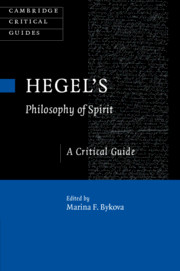Book contents
- Hegel’s Philosophy of Spirit
- Cambridge Critical Guides
- Hegel’s Philosophy of Spirit
- Copyright page
- Contents
- Contributors
- Acknowledgments
- Abbreviations
- Introduction
- Part I Philosophy of Spirit and Hegel’s Philosophical System
- Part II Philosophy of Subjective Spirit
- Part III Philosophy of Objective Spirit
- Part IV Philosophy of Absolute Spirit
- Chapter 10 The “Absoluteness” of Hegel’s Absolute Spirit
- Chapter 11 Art as a Mode of Absolute Spirit:
- Chapter 12 Art, Logic, and the Human Presence of Spirit in Hegel’s Philosophy of Absolute Spirit
- Bibliography
- Index
- Cambridge Critical Guides
Chapter 10 - The “Absoluteness” of Hegel’s Absolute Spirit
from Part IV - Philosophy of Absolute Spirit
Published online by Cambridge University Press: 24 June 2019
- Hegel’s Philosophy of Spirit
- Cambridge Critical Guides
- Hegel’s Philosophy of Spirit
- Copyright page
- Contents
- Contributors
- Acknowledgments
- Abbreviations
- Introduction
- Part I Philosophy of Spirit and Hegel’s Philosophical System
- Part II Philosophy of Subjective Spirit
- Part III Philosophy of Objective Spirit
- Part IV Philosophy of Absolute Spirit
- Chapter 10 The “Absoluteness” of Hegel’s Absolute Spirit
- Chapter 11 Art as a Mode of Absolute Spirit:
- Chapter 12 Art, Logic, and the Human Presence of Spirit in Hegel’s Philosophy of Absolute Spirit
- Bibliography
- Index
- Cambridge Critical Guides
Summary
As natural, intuitive, and commonsense as it may be for the interpreter to refer to “the Absolute” in Hegel’s philosophy as a clearly identifiable concept and even as a substantive entity of some kind, a quick terminological survey of his works should already convince us of the contrary. Such a survey would allow us to easily ascertain that Hegel always employs the term “absolute” as a noun with the greatest restraint, and that when he does use it in such a way, he either accompanies the term by careful qualifications or employs it in a critical, even polemical function, generally aimed at specific contemporary or past occurrences (prominently, although not exclusively, Schelling and Spinoza). On the other hand, the dearth of the term as a noun – “the Absolute” – is counterbalanced by the wide-ranging employment of the adjective – “absolute” – which appears in every sphere of Hegel’s philosophical system. Herein the adjective (and the adverb) plays a crucial role, first and foremost, in specifying in a systematically distinctive way the validity of notions that are otherwise disconcertingly ubiquitous and ambiguous in Hegel’s philosophy – notions, that is, such as concept, idea, spirit, unity, and truth, to name just a few. On this terminological basis, following a persuasive suggestion by John Burbidge (who himself responds to an original hint by Eric Weil (Burbidge 1997, 33)), I have argued that contrary to what many interpreters seem to assume, there is simply no original, substantive “Absolute” in Hegel’s philosophy, but that the adjective “absolute” (along with the adverb) is instead a systematically crucial, topological predicate that indicates the “place” or position of a certain determination or concept (and its reality) within the overall structure of philosophical thinking. Moreover, this position is not a static point or marker within a given whole but is rather a dynamical stage in the process through which the whole of philosophy is first constituted in the form of a complete system. This is, to be sure, the first step in a broader discussion that leads to the further question of what warrants the designation of “absolute” for a certain moment within such a process. In other words, what is it that makes a certain moment at stake at a specific stage of the systematic constitution of the whole of Hegel’s philosophy an “absolute” moment? And, furthermore, is the “absoluteness” of all “absolute” structures and concepts the same?
- Type
- Chapter
- Information
- Hegel's Philosophy of SpiritA Critical Guide, pp. 207 - 224Publisher: Cambridge University PressPrint publication year: 2019
- 1
- Cited by



